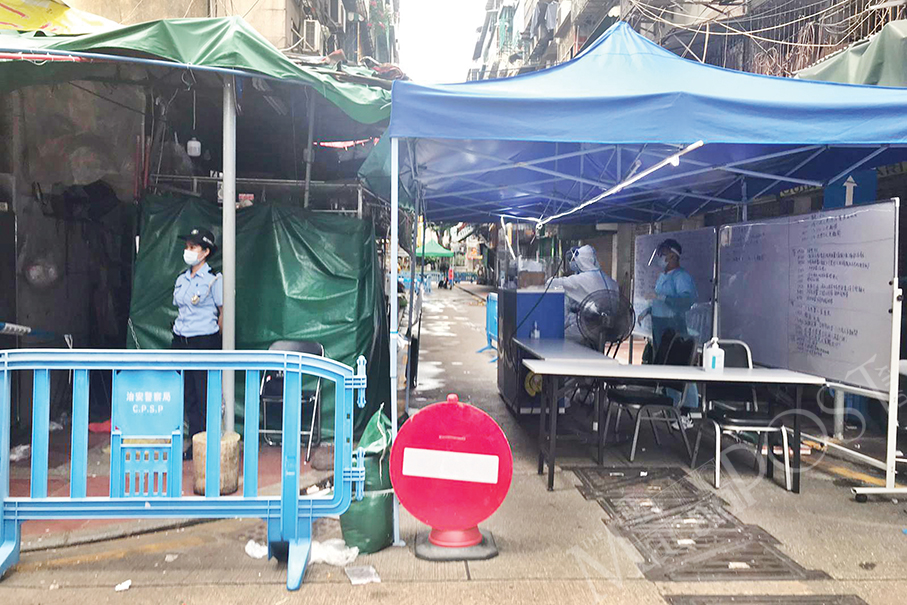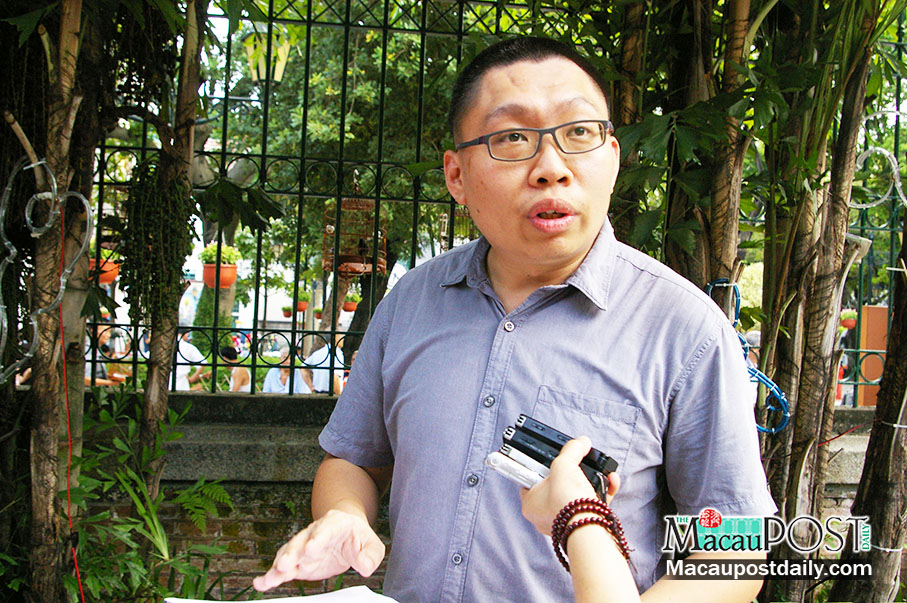Addressing yesterday’s press conference about Macau’s novel coronavirus situation, Tai Wa Hou, a clinical director of the public Conde de São Januário Hospital Centre, announced a string of stronger COVID-19 screening measures with the aim of detecting those in the community who have possibly been infected with the novel coronavirus as early as possible.
For instance, according to Tai, when a person with any COVID-19 symptoms sees a doctor at a private clinic, the doctor must report the situation to the Health Bureau (SSM) on a newly-launched system online, which will then turn the patient’s Macau Health Code yellow. The patient will then have to undergo a free COVID-19 test at some of the city’s nucleic acid test (NAT) stations, and their health code will only return to green after their negative NAT results are available.
Those with a yellow Macau Health Code are barred from leaving Macau, entering various premises in the city, and taking public transport.
The stronger COVID-19 screening measures started yesterday.
Tai said that residents should become well aware of the fact that the risk of COVID-19 infection is potentially anywhere in the local community in the wake of the COVID-19 cases that could result from Macau’s Delta variant family cluster – which was confirmed early this month. Residents should be aware of the importance of detecting those who have possibly been infected with COVID-19 in the early stage, Tai said.
Tai noted that most of those who have been newly infected with COVID-19 in the early stage only come down with mild symptoms, which means that the situation was very likely to cause a widespread community transmission if each case is not detected early.
Tai noted that one of the most effective ways to detect possible COVID-19 carriers is to arrange for them to undergo a nucleic acid test. Consequently, Tai said, there is a need to strengthen the government’s measures to screen residents in the community for the novel coronavirus disease.
4 scenarios
During yesterday’s press conference, Tai announced a string of new guidelines as to how residents should take the initiative to undergo a COVID-19 test in different scenarios.
Firstly, Tai, said, those who suspect that they might have been infected with COVID-19 can book a free nucleic acid test on a link available on the frontpage of the Macau Health Code system, which is available at the Taipa Ferry Terminal testing station in Pac On and the Macau Forum testing station in Zape.
Secondly, according to Tai, those with a fever, any other respiratory symptoms, or reduced sense of smell or taste must report the situation on the Macau Health Code, which will then change their health code colour to yellow. They should see a doctor as soon as possible.
Thirdly, those who have come down with symptoms listed in the second point as well as fatigue or diarrhoea should seek treatment at the emergency department of one of city’s hospitals. In this case, Tai said, the doctor will change the Macau Health Code colour of the patients to yellow, and “immediately” arrange for them to undergo a COVID-19 nucleic acid test there. Their health code colour will return to green after their negative NAT results are available.
Macau has three major hospitals, namely the public Conde de São Januário Hospital Centre, the private Kiang Wu Hospital, and the University Hospital run by the private Macau University of Science and Technology (MUST) in Taipa. COVID-19 nucleic acid testing is available at the three hospitals.
Fourthly, Tai said that if those with any of the symptoms choose to see a doctor at a private clinic, the doctor must report the situation to the Health Bureau on an online system, which will then turn the patient’s Macau Health Code yellow, because of which, Tai said, the patients will then have to undergo a free COVID-19 test at certain NAT stations. Their health code colour will return to green after their negative NAT results are available.
3 levels of COVID-19 risks
Concerning those who see a doctor at a private clinic, according to Tai, the COVID-19 testing arrangements are different depending on their respective risks. Tai mentioned details for three groups of people with three different levels of risk, namely those “without epidemiological risk”, those “with a rather high epidemiological risk”, and those “with a high epidemiological risk”.
According to Tai, those “without epidemiological risk” should undergo a COVID-19 test within 24 hours after seeing the doctor at the private clinic. They can choose to book a test at the Taipa Ferry Terminal testing station or the Macau Forum testing station, or have a walk-in test without the need to make an appointment at the emergency departments of the public hospital or Kiang Wu Hospital, the public hospital’s emergency service branch in Taipa – which is located next to MUST’s University Hospital, or one of four designated health centres – Ilha Verde, Praia do Manduco (Ha Van), Areia Preta or Nossa Senhora do Carmo-Lago.
According to Tai, those “with a rather high epidemiological risk” refers to those who have been in contact with a large number of members of the public or patients in their jobs, or those working or living in retirement homes.
Tai said that those “with a rather high epidemiological risk” should undergo a walk-in COVID-19 test “as soon as possible” at the emergency departments of the public hospital or Kiang Wu Hospital, the public hospital’s emergency service branch in Taipa or one of the four designated health centres. They can leave the testing sites after having their samples collected without the need to wait for their NAT results to become available.
According to Tai, those “with a high epidemiological risk” refers to those working in COVID-19 isolation wards, quarantine hotels or at the airport, those who have been in contact with travellers from COVID-19 high-risk areas, those whose job requires them to enter passenger transport vehicles (such as aeroplanes) arriving from COVID-19 high-risk areas, those who have been in contact with COVID-19 patients within the past 28 days, those who have stayed in places or been on passenger transport vehicles within the past 28 days where COVID-19 transmissions had occurred, those who have visited indoor venues within the past 28 days where COVID-19 patients had stayed, or those with serious respiratory symptoms.
Tai said that those “with a high epidemiological risk” should “immediately” undergo a COVID-19 test, in which case the private clinic must call an ambulance to take the patient to the special emergency ward of the public Conde de São Januário Hospital Centre for a nucleic acid test. The patients must wait for his or her NAT results to become available – i.e. they cannot leave the facility until their negative NAT results are available.
Tai urged residents to “cooperate” with the strengthened COVID-19 screening and testing measures during the still “critical” period.
Lockdown to be lifted tomorrow if no COVID-19 positive cases detected
Meanwhile, Health Bureau (SSM) Control of Communicable Diseases and Surveillance of Diseases Department Coordinator Leong Iek Hou said during yesterday’s press conference that the Macau Health Code colour of those living in the city’s two COVID-19 locked-down areas (red code zones) and a yellow code zone would become green tomorrow – i.e. the 14-day lockdown would be lifted – if no new COVID-19 positive cases are detected by tonight.
The government launched a three-day mass nucleic acid test (NAT) drive on August 4 after Macau confirmed four COVID-19 cases the day before, a family of four comprising a couple and their two children, a schoolboy and a schoolgirl. All of them were infected with the Delta variant. All of the 614,465 people who took part in the 72-hour citywide NAT drive early this month tested negative for COVID-19.
The two COVID-19 locked-down areas (red code zones) resulting from the family cluster cover the building where the four-member family usually live (Mei Lin Building in Rua de Coelho do Amaral) and two adjacent buildings, as well as the building where the fruit shop – where the family’s mother usually works – is located and the shops nearby. Those living in the two red code zones have been forbidden from leaving their homes during the lockdown period. Since the buildings were locked down following the confirmation of the COVID-19 family cluster, 286 residents have been undergoing home quarantine in the two red code zones.
In addition, five other buildings near Mei Lin Building are covered by a yellow code zone – i.e. the Macau Health Code colour of residents living there has become yellow – which has barred them from leaving Macau, entering various premises in the city, and taking public transport – despite the fact that they can leave their homes.
Those in hotel quarantine due to the COVID-19 family cluster, those living in the two red code zones and those living in the yellow code zone are subject to a number of follow-up nucleic acid tests. All of them have so far tested negative for COVID-19.
Leong noted yesterday that the 14-day period of the two red code zones and the yellow code zone will end tonight, following the confirmation of the four-member family cluster on August 3. Leong said that the three zones’ restrictions would be lifted at 00:00 tomorrow if no COVID-19 positive cases are detected by tonight among those affected by the Delta variant family cluster, such as those undergoing hotel quarantine due to the COVID-19 family cluster, those living in the three zones, those had visited either of the two red code zones, and those who had visited the same places as the four COVID-19 patients at the same times.
When the three zones’ curbs are lifted, the Macau Health Code colour of those living there will return to green, Leong said.

Two police officers work at the red code zone in Rua da Emenda on Sunday, which covers a fruit shop where the COVID-19 family cluster’s mother usually works. Photo: Maria Cheang Ut Meng
Tai Wai Hou (right), one of the three clinical directors of the public Conde de São Januário Hospital Centre, speaks during yesterday’s press conference about the city’s novel coronavirus (COVID-19) situation, as Health Bureau (SSM) Control of Communicable Diseases and Surveillance of Diseases Department Coordinator Leong Iek Hou looks on. Photo: Tony Wong








